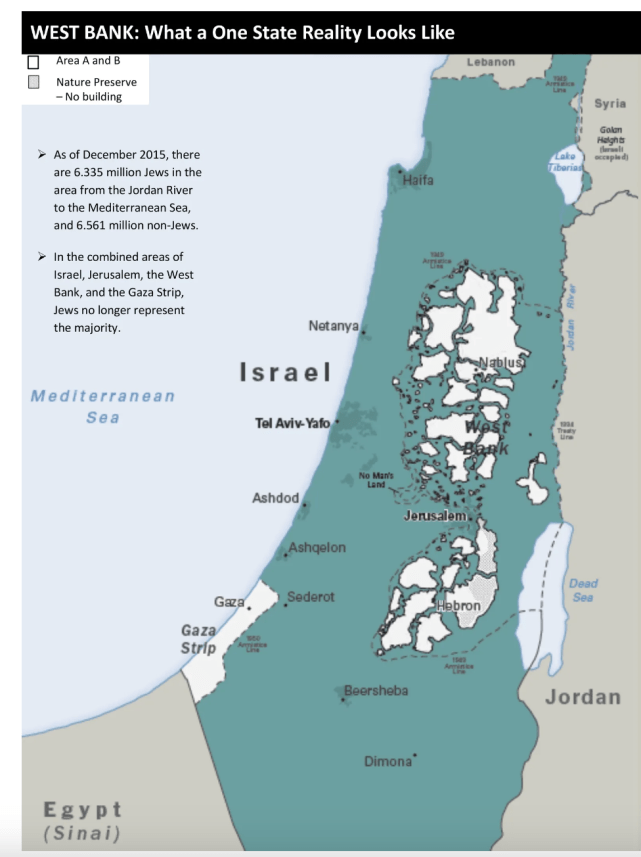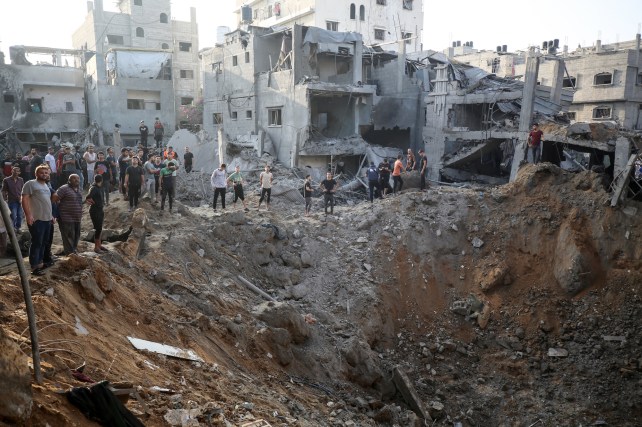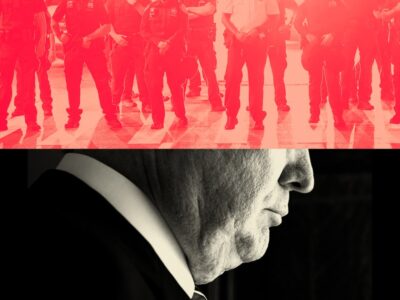
In 1951, three years after Israel came into existence, Shibley Telhami was born in a village outside Haifa that lacked running water or electricity. Telhami, who comes from a family of Palestinian Christians, has said it was impossible not to be interested in war and peace while growing up: The Arab-Israeli War of 1967 broke out as he was taking a high school final in biblical Hebrew. Soon after, he left to study mathematics at Queens College in New York.
Five decades later, Telhami is the Anwar Sadat Professor for Peace and Development at the University of Maryland, where he has taught since 1997. As a leading expert on Israel and Palestine, public opinion in the Arab World, and America’s role in the region, Telhami has advised multiple US presidential administrations, starting with that of George H.W. Bush. He is the author of many books, including “The World Through Arab Eyes: Arab Public Opinion and the Reshaping of the Middle East.”
Earlier this year, Telhami and co-authors argued in a book and accompanying article for Foreign Affairs headlined “Israel’s One-State Reality” that Israel has created a “permanent condition” for Palestinians in which “one state ruled by one group of people rules over another group of people.” They argue that it is counterproductive to continue to see Israel-Palestine through a two-state framework, given the Israeli-dominated reality that exists on the ground.
Telhami and I spoke Monday about the ways in which Americans can misunderstand the Israel-Palestine conflict, and what he sees as the failure of President Joe Biden’s response to the brutal October 7 attack by Hamas. The conversation has been lightly edited for length and clarity.
What is the one-state reality that you and co-authors have written about?
I have personally been a supporter of two states since long before it was on the table. Even today, if somebody proves to me that there’s a viable path to two states soon, I would say, grab it.
The problem is it has been impossible to see a credible path to two states. The prospect of two states has only diminished since the collapse of the Camp David negotiations in 2000 that Bill Clinton mediated between the Israelis and the Palestinians. Those of us who were writing on this kept saying, it’s two minutes to midnight. Then you wake up one day and it’s been two minutes to midnight for two decades.
In the meantime, what we have seen is settlements that have expanded dramatically in the West Bank. You really cannot even see how there could be a contiguous state unless you had dismantlement of so many settlements that it would be politically impossible—particularly without any will from inside Israel or from the international community to put pressure on Israel to do that.

A State Department map obtained by the New Yorker that shows Israel’s systematic effort to encircle Palestinian population centers with Jewish settlements in the occupied West Bank.
New Yorker
We believe that the entire territory—the West Bank, Israel, and Gaza—has in effect been a one-state reality. In the West Bank, the Palestinian Authority is really no more than a service provider at a local level to the Palestinians, and something like a subcontractor for Israeli security. It certainly has no power in defending Palestinians against not only Israeli military incursions, but even against settler violence, which is expanding in the West Bank.
Even related to Gaza, where Israel had actually withdrawn, Gaza has not been an independent state. Gaza has been under blockade for years. Even before it was technically a blockade and long before Hamas took over, Israel was still considered the occupying power. Gaza doesn’t have sovereignty. Gaza cannot have exit to the outside world through Israel. Gaza does not have access to the sea. It does not have access to the air. Even though there’s an opening to Egypt, Egypt coordinates with Israel about what to allow because they consider Israel the occupying power.
There’s an understandable impression that can come from the coverage of the October 7 attack that Israel and Palestine had been at peace, and now suddenly they’re at war. Was the Israeli occupation peaceful for Palestinians prior to October 7?
That, perhaps, is the biggest myth. I had written this piece that I circulated in April, saying that the US approach is wrong because it doesn’t recognize that the status quo is itself violent. By the violent status quo, I meant three elements.
One is the fact that you have a 56-year-old occupation. That is a violent act because even for Palestinians not involved in what we see as violence, meaning shootings and death, it is military control. It involves being asked by a young person with a gun pulled towards you to show an ID to go visit a relative across a checkpoint.
It is violent in the sense that there’s no one to defend them when there are Israeli military incursions that often are done for security purposes, but sometimes seem to be draconian in a way that is terrifying. We’ve also seen settler violence increase over and over, particularly since the ascent of this Israeli government. But even before that, there was increasing settler violence with no one to defend them at all.
In addition to that, you have the Palestinians in prison. It’s estimated that there’s been about a million Palestinians who have been imprisoned throughout the occupation. There are thousands in prison now, including over 1,000 who have not faced charges or trial.
I need to make clear: Explanation is not justification. When one gives a background that explains the context in which something happens, one is not morally justifying acts that are unjustifiable. Targeting civilians and recklessly endangering them is absolutely unjustified for any cause. No cause can justify that.
But if we can’t explain, we’re doomed. If we can’t analyze, we will never learn and will keep repeating the same mistakes that lead to disaster after disaster. We need to be able to open our minds and think objectively, despite the pain that everyone feels.
I’ve heard some Americans praise President Biden’s response to the attack because they feel like he is gaining private leverage to reduce suffering in Gaza by publicly embracing Netanyahu. What is your view on that?
His reaction on the day of the attack was right. On a day when people are vulnerable, when they’ve lost loved ones, when they need somebody to say, I’m with you, I feel your pain. That’s good. That’s important. I think that no one should fault him for that because that was the right thing to do—to stand with people under attack at a moment of vulnerability.
Since then, his posture went from good to bad. I have spoken to a lot of administration people in the White House and the State Department in the past few weeks. They have let on this idea that, Yes, the president isn’t saying much publicly, but he is doing a lot more privately. I don’t see that. Why do I not see that?
Number one, because there’s a huge cost for his public posture both in not only dehumanizing Palestinians but also in losing much of the Middle East and the Global South, where I think he very quickly became the George W. Bush of the Iraq War. If I were to do a public opinion poll, like ones I did back then, when George W. Bush became even more disliked in the Arab world than Israeli Prime Minister Ariel Sharon, I would bet that Biden today might even supersede Benjamin Netanyahu as the most disliked leader in the Arab world. There’s a level of shock that I have not seen, even during the Iraq War, when it was extremely shocking.
Number two, to the extent that he mobilized the West with a similar message, he clearly created a global polarization on this issue the likes of which we have not seen. We see that the Global South is coalescing, and the Arab and Muslim world is seeing this as a Western assault on their humanity in a way that we haven’t seen in the past.
Third, the president’s private posture has obviously failed. When you have over a million homeless people and much of Gaza destroyed and 30,000 casualties between dead and wounded, that’s not a success—it’s a failure.

People check buildings destroyed in an Israeli strike on the Al-Maghazi refugee camp in Gaza on Friday.
Majdi Fathi / Getty
Finally, the idea of, if not embracing, tolerating the scale of the Israeli action in Gaza, is problematic from America’s national interests point of view—separating that from the moral and the international law for a moment. It is a problem for US interests because the president absolutely cannot assume that Israeli interests and American interests coincide. The president knows that you have the most extreme Israeli government, with ministers whose stated positions conflict with both America’s interests and America’s values. Netanyahu is known to have tried to drag the US into war with Iran. Obama resisted, and even Trump resisted. It is not clear to me that this president has put himself in a position to avoid that given the escalatory implications of his posture in Gaza, where Hezbollah can get drawn in, Iran can get drawn in, and the US can get drawn into the war.
I think that the administration is not being mindful of the consequences of its action for American interests—not only vis-a-vis the potential of war with Iran, but also in what I call this narrative-forming moment, in Arab and Muslim countries. The American posture is shaping the views of perhaps an entire generation.
What might the consequence of that be for the United States in relation to the Arab world?
It always plays into the hands of militants. The very militants that you’re trying to defeat, in fact, are able to recruit. They say, You see, this is really an American war, not an Israeli war. You see, they don’t care about Palestinian lives. You see, passivity doesn’t doesn’t work.
When you have public opinion in the Arab world so dramatically mobilized, and so much opposition to the United States and Israel, governments become less cooperative. They consider other options. It’s not hard to see that they get more attracted to the Global South coalition. They get more attracted to China, which is trying to capture the moment. Russia, which is also trying to capture the moment. It’s detrimental to America’s interest in multiple ways.
The phrase we probably hear the most in the United States about what’s happening in Gaza is “humanitarian crisis.” I wanted to get your perspective on that phrase.
I’ve spoken to administration people who said, “We’re being mindful of the humanitarian disaster, and we are making that a part of our talking points.” I was just shocked to hear that they think that by just saying, Oh, we care about the humanitarian problem for the Palestinians, it’s equivalent to what is needed here, which is condemnation of the actions that are bringing those outcomes about.
You’re not sending aid to people who are suffering from the impact of an earthquake or hurricane. It’s a humanitarian disaster that is the result of bombings—often using American bombs and American airplanes. If you don’t condemn or slow down these actions, nobody’s going to hear you and then people are going to dismiss what you’re saying.
I’ve gotten a sense that some Democrats think a US president has no choice from a domestic politics perspective but to fully back Israel. What does polling and other data show about the accuracy of that belief?
I don’t agree that presidents don’t have choices because of political reasons. It’s nonsensical. Most Democrats are not as one-sided as the president is. In all polling that we’ve done, a majority of Democrats want the US to be even handed on Israel-Palestine. This is separate from polling, like Gallup, which is showing that it’s shifted to where more Democrats are more sympathetic with Palestine than with Israel. Obviously, now with the attack by Hamas, things could shift.
I ask you to think this way: If Bernie Sanders had been president, would he have taken the same positions that President Biden has taken? I would say no. I have advised four different administrations: two Republicans and two Democratic. I don’t think what the president is doing is the automatic political thing. And in the end, I actually think that it’s probably going to cost him the election.
Israel has stated that its fundamental aim is to destroy Hamas. The United States has effectively fully supported this position. Assuming you don’t think that is the right approach, what should the Biden administration be doing instead?
I would say you start seeking a ceasefire right away. Why? Because I don’t even know what destroying Hamas means for three reasons. Number one, given what I know about how things work in Gaza, destroying Hamas in Gaza means destroying Gaza. That ought to be absolutely unacceptable under any circumstances.
Second, if you destroy Gaza and Hamas, what do you think is going to happen with the 2.3 million people that have become homeless and whose homes are destroyed? Are they going to become peaceniks? We’ve seen this movie before. Militancy is going to grow.
Number three, it will most likely draw in parties that don’t want to be involved. I think Hezbollah prefers not to get into war. I think that Iran prefers not to get into war. But they could get drawn into it because of the scale. But more importantly, if I’m in Hezbollah’s position, I would be saying to myself, If they decided to do this to Hamas, they’re going to come after me when they’re free of the war with Hamas. Shouldn’t I be starting something sooner?
So, we’re on an escalatory path that could be devastating. Even if the Israelis don’t want a ceasefire, you start pushing for it. You are not a bystander. You are an enabler. You are the one putting the money up. You are the one providing the weapons. You are the one employing the vetoes to prevent censure at the UN.
When the president says there hasn’t been enough of a price, I am shocked. I am absolutely shocked. What is the price, when you have the ratio of casualties that already is probably six-to-one between Palestinians and Israelis? That doesn’t include the homeless people. There are some Israelis—over 100,000—who have had to move from their homes temporarily. But in Gaza, you have homes that have been totally destroyed. You have over a million people, maybe 1.5 million people displaced. So what is the acceptable price?
It isn’t clear to me for what purpose the fighting goes on. I would call for a ceasefire. I would call for release of the hostages. And I would call for serious diplomacy toward a path to end this conflict. As long as the Palestinians don’t have freedom, it is impossible not to fall back into another cycle of major violence. And, of course, not to forget the subtle violence that is constant, that has been there for more than half a century, that comes out of a military occupation that deprives people of basic freedoms.















